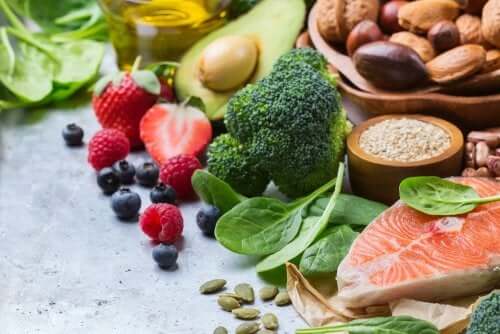The Importance of a Mother’s Diet While Breastfeeding
A mother's nutritional state influences her health and that of her baby, both before conception and during pregnancy and lactation. Read the following article to find out more about the importance of a mother's diet while breastfeeding.

Breastfeeding is, without a doubt, the best food for newborn babies during their first months of life. But what about the mother? Often, she arrives at birth with depleted nutritional reserves or with specific deficiencies, for example, of iron. That’s why it’s important to take into account the importance of a mother’s diet while breastfeeding.
Effects of breastfeeding on the mother
The benefits of breastfeeding for the baby are well known and widely recognized. However, it’s also important to know the influence it has on the mother. Some benefits of breastfeeding for mothers include the following:
- Better post-partum recovery
- Decrease in postpartum uterine bleeding
- Decreased risk of postpartum depression
- Increase in the period of amenorrhea or absence of periods after birth

- Reduced postpartum weight gain and even decreased weight
- Decreased risk of breast or ovarian cancer
- Reduced risk of other diseases, such as type 2 diabetes or rheumatoid arthritis
- Psychological benefits
Importance of a mother’s diet while breastfeeding
A mother’s nutritional state influences her health and that of her baby, both before conception and during pregnancy and lactation. However, except in cases of extreme malnutrition or significant deficiencies, a woman’s nutrition doesn’t usually have a major impact on the quality of her milk and its production.
However, we shouldn’t forget that breast milk is a great source of nutrition. This often means a significant loss of these nutrients for the mother. During breastfeeding, a woman should increase her nutritional intake, although not in the same way for all nutrients.
For example, the fat content of milk depends on the mother’s diet. The same is true for water-soluble vitamins and vitamins A and D. However, the content of carbohydrates, proteins, or some minerals, such as calcium or iron, doesn’t depend as much on the mother’s diet.
The World Health Organization (WHO) recommends that the percentage of energy provided by fats in the diet should be more than 20% of the total energy intake. This is to ensure good absorption of essential fatty acids and fat-soluble vitamins.
In short, the mother’s diet during breastfeeding shouldn’t be very different from that of her pregnancy. Although caloric recommendations depend a lot on each professional and the needs are different for each mother, in general, a diet with an average of 2700 Kcal per day is ideal.

Is the consumption of nutritional supplements necessary?
As a general rule, it’s not necessary to take specific nutritional supplements while breastfeeding. However, it’s important to evaluate each particular case. Many doctors recommend, for example, that mothers continue taking the same iodine, folic acid and vitamin B12 they took while pregnant.
In some cases, it’s necessary to administer iron to recover what the woman may have lost during childbirth, for example, and to replenish the body’s reserves. There are also specific nutritional supplements for this period of lactation, similar to those available for pregnancy.
Conclusion
In short, the mother’s nutrition during breastfeeding should follow a balanced diet. Quantity isn’t as important as quality.
Women should follow their doctor’s advice on a healthy diet. This should include eating fruit and vegetables, dairy products, meat and fish, healthy fats, and a minimum of 2 liters of water a day. Also, breastfeeding mothers should avoid, for example, the consumption of caffeine, alcohol, saturated fats, fish that may be contaminated, etc.

